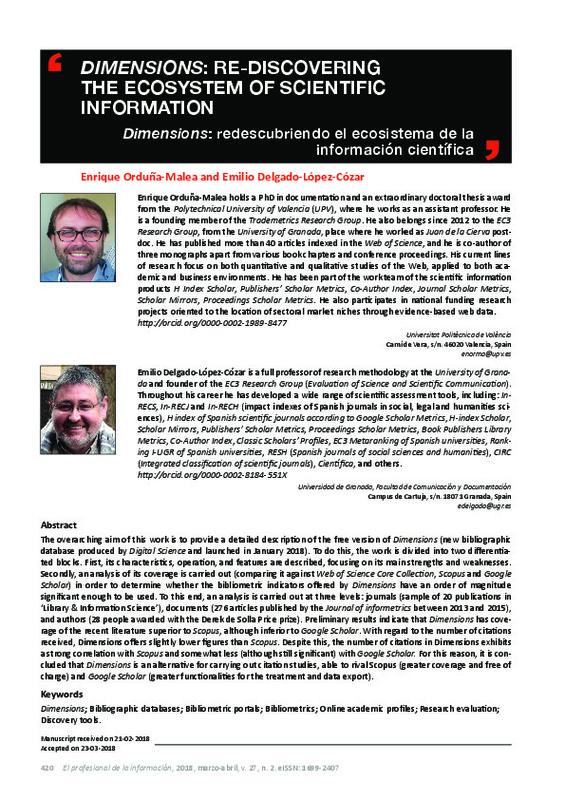JavaScript is disabled for your browser. Some features of this site may not work without it.
Buscar en RiuNet
Listar
Mi cuenta
Estadísticas
Ayuda RiuNet
Admin. UPV
Dimensions: Re-discovering the Ecosystem of Scientific Information
Mostrar el registro sencillo del ítem
Ficheros en el ítem
| dc.contributor.author | Orduña Malea, Enrique
|
es_ES |
| dc.contributor.author | Delgado-López-Cózar, Emilio
|
es_ES |
| dc.date.accessioned | 2020-01-26T21:01:40Z | |
| dc.date.available | 2020-01-26T21:01:40Z | |
| dc.date.issued | 2018 | es_ES |
| dc.identifier.issn | 1386-6710 | es_ES |
| dc.identifier.uri | http://hdl.handle.net/10251/135614 | |
| dc.description.abstract | [EN] The overarching aim of this work is to provide a detailed description of the free version of Dimensions (new bibliographic database produced by Digital Science and launched in January 2018). To do this, the work is divided into two differentiated blocks. First, its characteristics, operation, and features are described, focusing on its main strengths and weaknesses. Secondly, an analysis of its coverage is carried out (comparing it against Web of Science Core Collection, Scopus and Google Scholar) in order to determine whether the bibliometric indicators offered by Dimensions have an order of magnitude significant enough to be used. To this end, an analysis is carried out at three levels: journals (sample of 20 publications in `Library & Information Science¿), documents (276 articles published by the Journal of informetrics between 2013 and 2015), and authors (28 people awarded with the Derek de Solla Price prize). Preliminary results indicate that Dimensions has coverage of the recent literature superior to Scopus, although inferior to Google Scholar. With regard to the number of citations received, Dimensions offers slightly lower figures than Scopus. Despite this, the number of citations in Dimensions exhibits a strong correlation with Scopus and somewhat less (although still significant) with Google Scholar. For this reason, it is concluded that Dimensions is an alternative for carrying out citation studies, able to rival Scopus (greater coverage and free of charge) and Google Scholar (greater functionalities for the treatment and data export). | es_ES |
| dc.language | Inglés | es_ES |
| dc.publisher | Ediciones Profesionales de la Informacion SL | es_ES |
| dc.relation.ispartof | El profesional de la información | es_ES |
| dc.rights | Reserva de todos los derechos | es_ES |
| dc.subject | Dimensions | es_ES |
| dc.subject | Bibliographic databases | es_ES |
| dc.subject | Bibliometric portals | es_ES |
| dc.subject | Bibliometrics | es_ES |
| dc.subject | Online academic profiles | es_ES |
| dc.subject | Research evaluation | es_ES |
| dc.subject | Discovery tools | es_ES |
| dc.subject.classification | BIBLIOTECONOMIA Y DOCUMENTACION | es_ES |
| dc.title | Dimensions: Re-discovering the Ecosystem of Scientific Information | es_ES |
| dc.type | Artículo | es_ES |
| dc.identifier.doi | 10.3145/epi.2018.mar.21 | es_ES |
| dc.rights.accessRights | Abierto | es_ES |
| dc.date.embargoEndDate | 2021-04-30 | es_ES |
| dc.contributor.affiliation | Universitat Politècnica de València. Departamento de Comunicación Audiovisual, Documentación e Historia del Arte - Departament de Comunicació Audiovisual, Documentació i Història de l'Art | es_ES |
| dc.description.bibliographicCitation | Orduña Malea, E.; Delgado-López-Cózar, E. (2018). Dimensions: Re-discovering the Ecosystem of Scientific Information. El profesional de la información. 27(2):420-431. https://doi.org/10.3145/epi.2018.mar.21 | es_ES |
| dc.description.accrualMethod | S | es_ES |
| dc.relation.publisherversion | https://doi.org/10.3145/epi.2018.mar.21 | es_ES |
| dc.description.upvformatpinicio | 420 | es_ES |
| dc.description.upvformatpfin | 431 | es_ES |
| dc.type.version | info:eu-repo/semantics/publishedVersion | es_ES |
| dc.description.volume | 27 | es_ES |
| dc.description.issue | 2 | es_ES |
| dc.relation.pasarela | S\374443 | es_ES |








